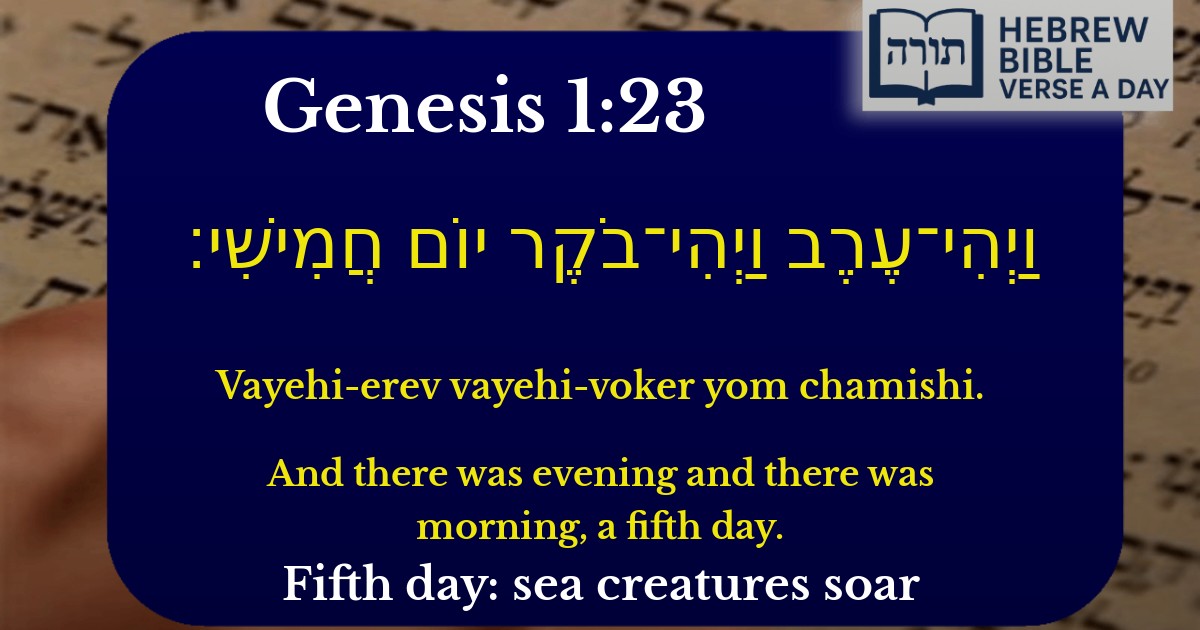Frequently Asked Questions
Q: What does 'And there was evening and there was morning, a fifth day' mean in Genesis 1:23?
A: This verse marks the completion of the fifth day of Creation, when Hashem created the creatures of the sea and the birds of the sky (as described in the preceding verses). The phrase 'evening and morning' teaches, according to Rashi, that the Jewish day begins at nightfall, following the order 'evening' first, then 'morning.' This structure is the basis for the Jewish calendar, where days start in the evening.
Q: Why is the order 'evening and then morning' significant in Genesis 1:23?
A: The Torah consistently mentions 'evening' before 'morning' (וַיְהִי־עֶרֶב וַיְהִי־בֹקֶר) to establish that the Jewish day begins at night. This principle is derived from the Creation narrative and is foundational for observing mitzvot (commandments) such as Shabbat and holidays, which start in the evening. The Talmud (Berachot 2b) discusses this concept in depth.
Q: What was created on the fifth day according to Genesis 1:23?
A: On the fifth day, Hashem created the creatures of the water (fish, sea animals) and the birds of the sky, as detailed in Genesis 1:20-22. The verse 'And there was evening and there was morning, a fifth day' concludes this stage of Creation. Rashi explains that these creatures were uniquely blessed to multiply abundantly, unlike the creations of other days.
Q: How does Genesis 1:23 relate to the Jewish understanding of time?
A: Genesis 1:23 reinforces the Torah's teaching that a new day begins at nightfall. This principle shapes Jewish law (halacha), including the timing of prayers, Shabbat, and festivals. The Rambam (Hilchot Kiddush HaChodesh) elaborates on how this structure defines the lunar-based Jewish calendar.
Q: What lesson can we learn from the repetition of 'evening and morning' in Creation?
A: The recurring phrase 'evening and morning' teaches that every phase of Creation—and by extension, every phase of life—has its own time and purpose. The Midrash (Bereishit Rabbah) notes that this orderly progression reflects Hashem's wisdom in structuring the world with balance and intention, guiding us to recognize divine planning in our daily lives.


The Fifth Day of Creation
The verse "וַיְהִי־עֶרֶב וַיְהִי־בֹקֶר יוֹם חֲמִישִׁי" (And there was evening and there was morning, a fifth day) concludes the account of the fifth day of Creation, during which Hashem created the creatures of the sea and the birds of the sky (Bereishit 1:20-23). This structural refrain appears at the end of each day of Creation, emphasizing the orderly progression of time and divine will.
Rashi's Commentary on the Sequence of Creation
Rashi (Bereishit 1:23) notes that the phrase "וַיְהִי־עֶרֶב וַיְהִי־בֹקֶר" signifies the completion of a full day cycle, where night precedes day (as per the Jewish calendar). He explains that the fifth day was uniquely significant because it introduced creatures capable of movement and reproduction, distinguishing them from the stationary creations of the previous days.
Rambam on the Order of Creation
In Moreh Nevuchim (2:30), Rambam discusses the philosophical underpinnings of the Creation narrative. He explains that the fifth day's creations—fish and birds—represent intermediate life forms between the purely physical (plants) and the more complex (land animals and humans). This reflects a divinely ordained hierarchy in nature.
Midrashic Insights
Kabbalistic Perspective
The Zohar (Bereishit 1:20a) associates the fifth day with the Sefirah of Hod (splendor), representing the harmonious diversity of aquatic and avian life. The evening and morning cycle reflects the balance of divine judgment (evening) and mercy (morning) in sustaining creation.